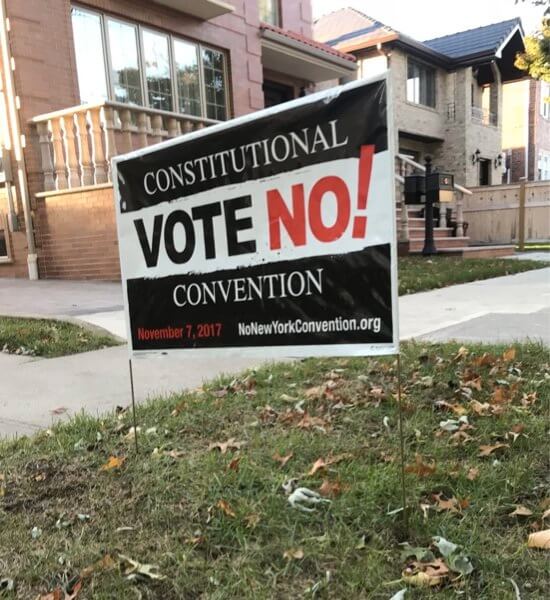By Naeisha Rose
The general election is just days away and one of the most crucial referendums on the back of the Nov. 7ballot is whether or not New York should hold a Constitutional Convention in order to tweak, overhaul or let the state’s charter remain the same.
Legislators and some special interests group say Vote No, while government reform groups want citizens to Vote Yes to what is affably called the “Con Con.”
The estimated cost to change the state’s treaty is upwards of $300 million, according to New Yorkers Against Corruption, a bipartisan coalition consisting of Republican and Democratic legislative lawmakers, pro and anti-choice advocates, and unions that do not support a Con Con.
If New Yorkers Vote Yes to a convention, the delegates who could rewrite the state’s charter will be comprised of three people elected from each of the 63 state Senate districts, and 15 “super delegates” from across the state, for a total of 204 convention delegates, according to the Sanctuary State Project, a government reform group.
City Council Majority Leader Jimmy Van Bramer (D-Sunnyside) and many other electeds are strongly opposed to changing the state’s Constitution because of fears that lobbyists will use their influence to reduce or remove rights New Yorkers already have guaranteed.
“A constitutional convention would open up governance in our state to special interests and extremely wealthy individuals and would see the delegate selection process rigged by the same Republican gerrymandering we have seen from Albany in our legislative and congressional districts,” Van Bramer said. “A Constitutional Convention would run the risk of rolling back decades of progress on environmental protections, workers’ rights, civil rights, and more.”
The Committee for a Constitutional Convention, one of the reform groups favoring a Con Con, believe that a Vote Yes will fast track legislation to improve education, end gerrymandering, update the court system, further establish women’s rights and stymie government corruption.
“The public has the chance to vote for a Constitutional Convention, which could address this problem by making proposals to deter corruption and breaches of trust no matter where in government they take place,” said Evan Davis, the manager of Committee for a Constitutional Convention. “Those statewide measures could include adopting strict standards for ethics enforcement, mandating adoption of a rigorous code of conduct, and creating a special prosecutor with statewide jurisdiction over corruption cases.”
Art Chang, a member of the Sanctuary State Project, said the $300 million cost for holding a convention would be spread out over the course of 20 years and is a drop in the bucket for the state’s budget, but most importantly progressives would benefit the most from a convention since New York is a predominantly blue state.
“Anyone who says a convention would be overrun by Republican or anti-labor interests is either not paying attention to the data or simply lying,” Chang said.
He did concede, however, that half the state Senate is made up of Republicans and that the Independent Democratic Conference has chosen to work with them against Democratic wishes.
State Sen. Leroy Comrie (D-St. Albans) said there is a better way to make improvements in government, and that is through the legislative process.
Even though the legislative process is slow and some bills, including his own, have been blocked by the IDC, he believes it is a better alternative to a convention where different issues could be lumped together in one bill and voted on.
Reach reporter Naeisha Rose by e-mail at nrose




































